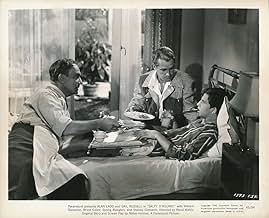Alan Ladd's partner has run out on him, leaving him owing bookie Bruce Cabot $20,000. Cabot gives him a month to pay -- dead men can't pay. Ladd and his trainer, William Demarest, buy a horse no one can ride, and find the jockey who can: Stanley Clements, a barred jockey. They use Clements' brother's birth certificate to get him accredited. However, because he is officially 17, he has to go to school, and the teacher is buttoned-down Gail Russell. Clements is in love with her, but his crude behavior means that Ladd has be polite to her, and she falls in love with him. Convinced that Ladd is cheating him, Clements decides to sell him out to Cabot.
Everyone acts in low-affect hoodlum style, and director Raoul Walsh takes advantage of this for his loud, crude humor -- he liked to quote Jack Pickford that his idea of light humor was to burn down the brothel.
The movie has a constant subtext of the crookedness of the racing world -- gangster bookies, jockeys ready to throw a race - that comes close to overwhelming the drama. Walsh keeps things balanced, and the movie has a constant air of tension, from the beginning, when Ladd thinks he's going to be killed, to the end. Spring Byington as Miss Russell's mother and Demarest work hard to give the movie a mildly comic, yet grounded air.
Alan Ladd never understood his own stardom. He once said "I have the face of an aging choirboy and the build of an undernourished featherweight. If you can figure out my success on the screen you're a better man than I." Yet it was that combination of fading good looks and mildly bewildered determination that sustained his career. It's used very well here.

































